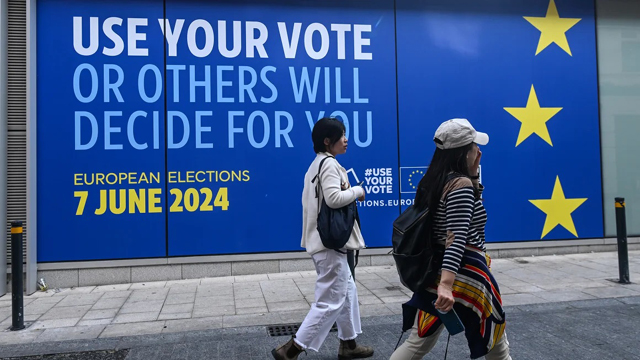
BRUSSELS, Belgium, June 2, 2024 (BSS/AFP) - Far-right parties are forecast to make inroads in EU elections June 6-9, with consequences for European policy-making over the next five years.
Which voters back them? How many seats might they win? And what extreme-right alliances might be formed?
- Youth support -
It is increasingly clear the far-right's nationalist, anti-immigrant rhetoric is resonating beyond its stereotypical support base -- older, often rural voters -- to win over younger Europeans, many of whom will be casting ballots for the first time.
While most young voters still lean left, polls show growing numbers being swayed by the far-right's deft use of social media such as TikTok, whose algorithm prioritises eye-catching and provocative content.
March polling for the Financial Times showed youth in several key EU nations nearly as likely as the oldest voters to back the radical right. In France, youth support was even higher, while in Italy it was lower.
- How many seats? -
Currently, the far-right in the European Parliament is broken into two main camps: the European Conservatives and Reformists (ECR) dominated by the Brothers of Italy party of Italian premier Giorgia Meloni; and the Identity and Democracy (ID) group including France's National Rally of Marine Le Pen.
ECR has 69 seats in the outgoing legislature. ID counted 59 before the exclusion last week of Germany's scandal-ridden AfD party and its nine lawmakers.
AfD is now unaffiliated -- along with the hard-right Fidesz party of Hungarian Prime Minister Viktor Orban, which today is exploring the possibility of joining the ECR.
- A far-right supergroup? -
Opinion polls suggest the ECR and ID together could increase their representation in the parliament from 20 percent to 25 percent.
Le Pen and Orban have voiced their hopes of uniting the far-right as a single, powerful bloc in the parliament able to sway policies on everything from immigration, to support for Ukraine and how far and fast Europe's green transition should go.
To get there, though, the factions would have to overcome deep divisions on Ukraine.
Meloni and the ECR back Brussels' current stance of offering deep-pocketed assistance and military supplies to Kyiv as it battles Russia's invading forces.
But ID, and Le Pen, with historic pro-Russian links, are against that, as is Orban, who maintains warm relations with President Vladimir Putin.
- Alliance with centre-right? -
European Commission chief Ursula von der Leyen, who hopes the election result will lead to EU leaders handing her a second term, has ruled out collaboration with the parties in the ID, which she called "Putin's puppets".
But she has opened the door to her centre-right European People's Party (EPP) working with Meloni's ECR lawmakers.
Such a tie-up would build a formidable rightist bloc in the parliament.
But the leftist Socialists and Democrats and the centrist Renew group, which includes French President Emmanuel Macron's party, warn that such a coalition could cost the EPP their crucial legislative support.
They, along with the Greens and more radical The Left, signed a vow this month never to cooperate with far-right groups and called on the commission boss to do the same.
Von der Leyen's courtship of Meloni also puts her second-mandate bid at risk.
The European Parliament needs to validate the leaders' choice of next commission president -- and the numbers may not stack up in von der Leyen's favour if the EPP's mainstream partners desert it.
- What might happen? -
Analysts believe the existing coalition between the EPP, Socialists and Renew will likely be maintained in the next parliament.
But with each of those mainstream groupings probably losing some seats, and the far-right increasing its weight, legislative passage could end up requiring some ad hoc cooperation between the centre-right and far-right on several issues.
A heftier extreme-right representation would also make itself felt on the European Union agenda, particularly when it comes to migration and asylum, the environment, and social issues running into conservative resistance.
Even though the impact of Brexit on Britain and public sentiment have pushed far-right parties away from previous ambitions to break apart the European Union, their Euroscepticism remains ardent, and they will seek to clip Brussels' wings.
Additionally, with nationalist stances getting a higher profile, the European Parliament could be less inclined to criticise democratic backsliding in certain EU countries, as it had done regarding Hungary and Poland in the outgoing legislature.